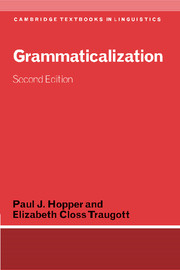Book contents
- Frontmatter
- Contents
- List of figures
- List of tables
- Preface and acknowledgments
- List of abbreviations
- 1 Some preliminaries
- 2 The history of grammaticalization
- 3 Mechanisms: reanalysis and analogy
- 4 Pragmatic factors
- 5 The hypothesis of unidirectionality
- 6 Clause-internal morphological changes
- 7 Grammaticalization across clauses
- 8 Grammaticalization in situations of extreme language contact
- 9 Summary and suggestions for further work
- Notes
- References
- Index of names
- Index of languages
- General index
3 - Mechanisms: reanalysis and analogy
Published online by Cambridge University Press: 05 June 2012
- Frontmatter
- Contents
- List of figures
- List of tables
- Preface and acknowledgments
- List of abbreviations
- 1 Some preliminaries
- 2 The history of grammaticalization
- 3 Mechanisms: reanalysis and analogy
- 4 Pragmatic factors
- 5 The hypothesis of unidirectionality
- 6 Clause-internal morphological changes
- 7 Grammaticalization across clauses
- 8 Grammaticalization in situations of extreme language contact
- 9 Summary and suggestions for further work
- Notes
- References
- Index of names
- Index of languages
- General index
Summary
Introduction
We turn now to some central concerns in any discussion of language change, with focus on those that are particularly important for an understanding of grammaticalization. In particular, we attempt to answer the questions: what motivates change, what mechanisms lead to grammaticalization, what are its probable “paths” of progression through time, and what are its end results? Particular changes do not have to occur, nor do they have to go through to completion, though some degree of change is inevitable. As elsewhere in this book, therefore, we will be referring to phenomena that make change possible or facilitate it, sometimes singly, sometimes together, not to factors that are absolute or obligatory. In this chapter we consider two general mechanisms by which grammaticalization takes place: reanalysis primarily, and analogy secondarily. In Chapter 4 we will discuss speaker/hearer asymmetries and processes of meaning production and perception that motivate the operation of these mechanisms, and also some semantically motivated mechanisms including metaphor and metonymy. The unidirectionality of paths of change will be the subject of Chapters 5, 6, and 7. In Chapter 8 we will discuss grammaticalization in the context of the development of creoles.
Reanalysis and analogy have been widely recognized as significant for change in general, most especially morphosyntactic change. In reanalysis, the grammatical — syntactic and morphological — and semantic properties of forms are modified. These modifications comprise changes in interpretation, such as syntactic bracketing and meaning, but not at first change in form.
- Type
- Chapter
- Information
- Grammaticalization , pp. 39 - 70Publisher: Cambridge University PressPrint publication year: 2003



